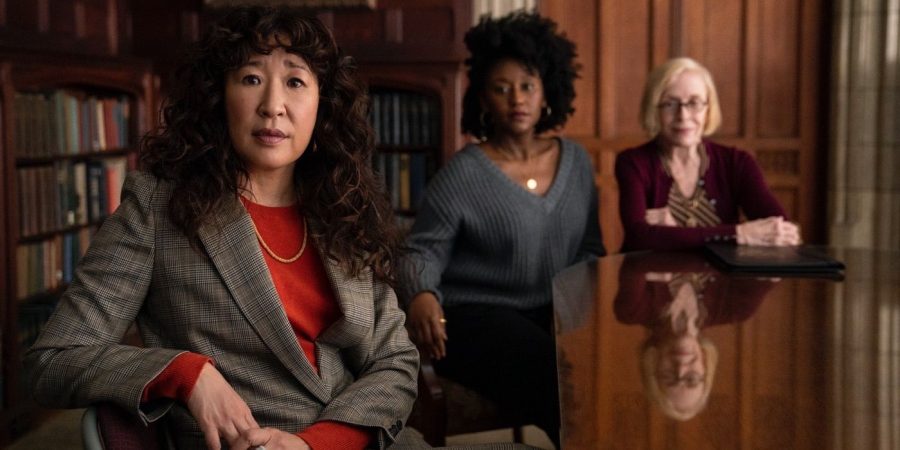A Woman of Color’s Relatable Insights in “The Chair”
Netflix’s new series tells the story of an overworked woman of color struggling between conflicting loyalties
“I feel like someone is handing me a ticking time bomb because they wanted to make sure a woman was holding it when it explodes,” Ji-Yoon Kim says in frustration at the misogyny that factors into her many struggles. This line in particular is what stood out to me and drew me to watch The Chair, a new Netflix original series starring Sandra Oh as a Korean American English professor. For six episodes, Oh plays Ji-Yoon, a recently elected head of a struggling and unstable fictional Ivy League department.
With Ji-Yoon being a woman of color, one might expect the rest of the department she leads to be diverse. Spoiler alert: it’s not like that at all. Almost a comical sight, 87% of Pembroke University’s English department looks like they came straight out of the 1800’s — old, white, male conservative professors. The color grading of The Chair only emphasizes how this prestigious university is stuck in the past; each shot is filtered to consist of browns, greys, creams, and beiges. Heck, they still use chalkboards at this school! It’s quite apparent that despite it being the 21st century, Pembroke is left behind, becoming the obvious setting for student enrollment rates to start dropping and angry mobs of students to begin protesting for change. And of course, the work is piled onto our main character, Ji-Yoon.

What makes The Chair so enticing is not just the laughable setting, but its ability to cover nuanced perspectives on relevant social issues, such as women of color’s voices, double standards, and cancel culture apologies. Moments like when the well-loved, young Black professor, Dr. Yasmin McKay, is denied tenure just so the three oldest white professors don’t lose their job is a prime example of women of color being stepped on to save face. Other instances include when a video of another white middle-aged male professor doing the Nazi salute leaks to the school and Ji-Yoon is left scrambling to clean up his mess. The Chair expanded its horizons so far, I wonder if it should have had more than six episodes.
Ji-Yoon is a relatable character who we meet during the whirlwind that is her life. She’s constantly in a state of distress, trying to please both opposing parties, care for her seemingly unloving daughter, and handle the new responsibilities that come with the title of department chair. Everything seems to be falling apart in her life, and so we find ourselves empathizing with her because this is a mirror image of so many people’s reality. Ji-Yoon, like many of us, won’t overstep a line of respect that often needs to be crossed to truly advocate for voices of color. Many are afraid to, but not doing so leads to only half-measures. To no surprise, Ji-Yoon finds herself doing just this. She, like us, sees the problems in society, but because of unfortunate circumstances, feels like she cannot do much about it.
With fictional conflicts that reflect the root issues of our world today, The Chair dives into several complex and nuanced stories that need to be told. Through Ji-Yoon, we see that not all problems from the outside are easily fixable. Wearing shallow lenses, Ji-Yoon would be no one’s favorite character because she makes so many poor choices; however, she teaches us the lesson of mental growth and the consequences of neglecting your own core values.


